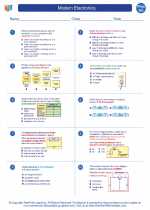Modern Electronics -> set point
Set Point in Physics
In physics, the term "set point" refers to a specific value or position that a system, such as a control system or a physical system, is designed to achieve or maintain. The set point is an important concept in understanding the behavior and stability of systems in various physical phenomena.
Understanding Set Point
In the context of control systems, the set point is the desired value or reference point that the system aims to reach and maintain. For example, in a thermostat system, the set point is the temperature set by the user, and the system works to maintain the actual temperature as close to the set point as possible.
Set point is also relevant in physical systems such as oscillatory motion, where the equilibrium position or amplitude of oscillation can be considered as the set point that the system seeks to achieve.
Study Guide
To understand the concept of set point in physics, it's important to cover the following key points:
- Definition: Define the term "set point" and explain its significance in the context of control systems and physical systems.
- Examples: Provide real-world examples of systems where the concept of set point is applicable, such as temperature control systems, oscillatory motion, and feedback control systems.
- Mathematical Representation: Explore how set points are represented mathematically in the context of control systems, including the use of equations and graphs to illustrate the relationship between the set point and the actual system response.
- Stability Analysis: Discuss the role of the set point in determining the stability of a system, and how deviations from the set point can affect the overall behavior and performance of the system.
Understanding the concept of set point is crucial for analyzing and designing control systems, as well as for studying the behavior of physical systems in various fields of physics.
By mastering the concept of set point, students can gain a deeper understanding of how systems strive to achieve and maintain specific values or positions, and how this impacts the overall dynamics and behavior of the system.
Remember to practice applying the concept of set point to different scenarios and systems to solidify your understanding and problem-solving skills.
Good luck with your studies!
[Set Point] Related Worksheets and Study Guides:
.◂Physics Worksheets and Study Guides High School. Modern Electronics

 Worksheet/Answer key
Worksheet/Answer key
 Worksheet/Answer key
Worksheet/Answer key
